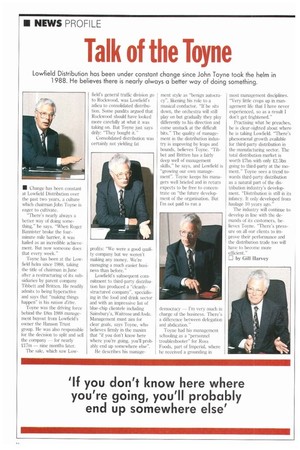Talk of the Toyne
Page 20

If you've noticed an error in this article please click here to report it so we can fix it.
• Change has been constant at Lowfield Distribution over the past two years, a culture which chairman John Toyne is eager to cultivate.
"There's nearly always a better way of doing something," he says. "When Roger Bannister broke the fourminute mile barrier, it was hailed as an incredible achievement. But now someone does that every week."
Toyne has been at the Lowfield helm since 1988, taking the title of chairman in June after a restructuring of its subsidiaries by parent company Tibbett and Britten. He readily admits to being hyperactive and says that "making things happen" is his raison d'être.
Toyne was the driving force behind the £8m 1988 management buyout from Lowfield's owner the Hanson Trust group. He was also responsible for the decision to split and sell the company — for nearly £17m — nine months later.
The sale, which saw Low field's general traffic division go to Rockwood, was Lowfield's adieu to consolidated distribution. Some pundits argued that Rockwood should have looked more carefully at what it was taking on. But Toyne just says drily: 'They bought it."
Consolidated distribution was certainly not yielding fat profits: "We were a good quality company but we weren't making any money. We're managing a much easier business than before."
Lowfield's subsequent commitment to third-party distribution has produced a "cleanlystructured company", specialising in the food and drink sector and with an impressive list of blue-chip clientele including Sainsbury's, Waitrose and Asda. Management must aim for clear goals, says Toyne, who believes firmly in the maxim that "if you don't know here where you're going, you'll probably end up somewhere else".
He describes his manage ment style as "benign autocracy", likening his role to a musical conductor. "If he sits down, the orchestra will still play on but gradually they play differently to his direction and come unstuck at the difficult bits." The quality of management in the distribution industry is improving by leaps and bounds, believes Toyne. "Tibbet and Britten has a fairly deep well of management skills," he says, and Lowfield is "growing our own management". Toyne keeps his managers well briefed and in return expects to be free to concentrate on "the future development of the organisation. But I'm not paid to run a democracy — I'm very much in charge of the business. There's a difference between delegation and abdication."
Toyne had his management schooling as a "personnel troubleshooter" for Ross Foods, part of Imperial, where he received a grounding in most management disciplines. "Very little crops up in management life that 1 have never experienced, so as a result I don't get frightened."
Practising what he preaches, he is clear-sighted about where he is taking Lowfield. "There's phenomenal growth available for third-party distribution in the manufacturing sector. The total distribution market is worth £7bn with only £2.5bn going to third-party at the moment." Toyne sees a trend towards third-party distribution as a natural part of the distribution industry's development. "Distribution is still in its infancy. It only developed from haulage 10 years ago."
The industry will continue to develop in line with the demands of its customers, believes Toyne. "There's pressure on all our clients to improve their performance and the distribution trade too will have to become more efficient."
LI by Gill Harvey












































































































